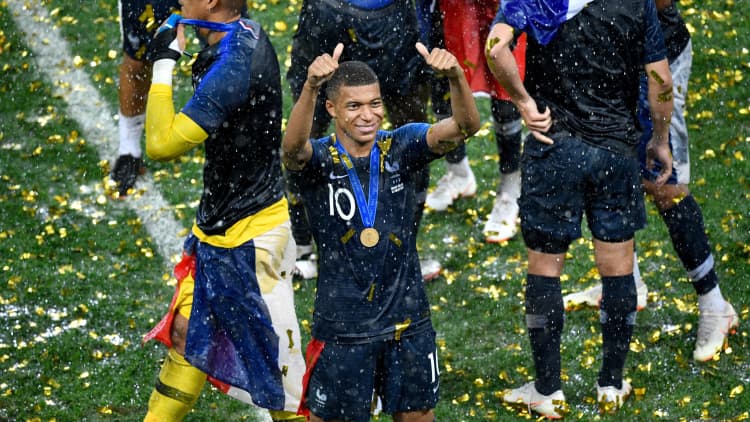This soccer World Cup has brought a lot of surprises, and it all comes to a head with the final Sunday, as the European Union’s newest member Croatia takes on France, one of the founding nations of the bloc.
The question is — who will win the match?
Economists and market analysts have tried to come up with predictions, using artificial intelligence and statistical modeling.
Swiss bank UBS tipped Germany for the win after running a computer simulation of the tournament 10,000 times, while Goldman Sachs used artificial intelligence and put their money on Brazil.
To be fair, several financial institutions like Goldman, ING, Nomura managed to accurately predict at least one final team — France, but CNBC has not yet come across any economist predicting Croatia making it to the final, underscoring the difficulty of predicting a World Cup winner.
Chief Economist Taimur Baig of Singapore-based bank DBS put it best. Referring to the oracular octopus Paul, he told CNBC that “at any given World Cup, I think the probability is as well determined by the octopus than an economist or a market analyst.”
While economists have managed to predict countries’ Olympic medal counts to a 98 percent accuracy rate using factors such as population, per capita income and past performance, their World Cup predictions using these factors have come up short.
After all, the most populous nations, including China, India and the United States have not made it to the World Cup finals.
In fact, World Cup finalist Croatia has a population of less than 5 million.
While it makes sense that richer countries would have better infrastructure and wealthier citizens with time to enjoy sports, that isn’t a clear indicator for success.
Baig notes that China is a cautionary tale about trying to buy soccer success.
"It's not the quantity but the quality of investment," he said.
Despite spending more than $600 million on soccer investment in 2016, the team of the world’s second-largest economy lost to Syria, a war-torn country with no home ground to host games.
The loss enraged Chinese fans so much that they took to the streets to protest.
Among the thirty-two final qualifying teams, half are from high-income countries and half are not. In fact, the variation in per capita income is stark. The richest is Denmark, which has a gross national income per capita of $56,990. That is almost 10 times that of the poorest, Senegal, at $5,950.
Furthermore, while professional soccer conjures up images of eye-watering transfer sums, such as Cristiano Ronaldo’s $117 million transfer to Juventus, the World Cup is comparatively a more modest affair.
According to FIFA, teams will win portions of the $400 million in total prize money, with $38 million for the winner.
Countries like Qatar and Bahrain have been known to invest in foreign athletes to boost their medal counts at the Olympics. But for soccer, FIFA requires the player to have lived in that country for at least five years.
That could explain why nearly half of the 82 foreign-born players in this World Cup were born in European countries with relatively high income per capita, but chose to play for comparatively less-wealthy African countries like Morocco, Tunisia and Senegal.
While professional soccer may be about dollars and cents, the World Cup may just be a little more priceless.



